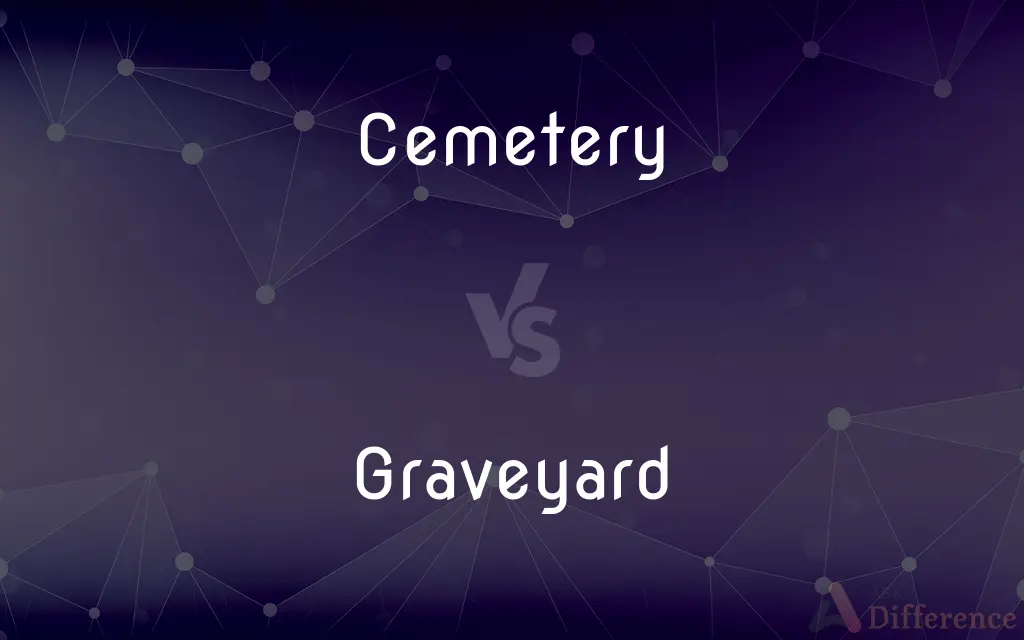Cemetery vs. Graveyard — What's the Difference?
Edited by Tayyaba Rehman — By Urooj Arif — Updated on March 25, 2024
A cemetery is a land designated for burials without a church, while a graveyard is specifically associated with and usually located on church grounds.

Difference Between Cemetery and Graveyard
Table of Contents
ADVERTISEMENT
Key Differences
The term "graveyard" historically refers to a burial ground that is part of a church's land, indicating its direct association with a place of worship. On the other hand, a cemetery is used more broadly to describe a place designated for burials that is not necessarily connected to a church or any religious institution.
While graveyards are often smaller and may have historical significance within the context of the church and its community, cemeteries tend to be larger, planned spaces that can accommodate a larger number of graves, including elaborate monuments, dedicated sections for different faiths, and landscaped gardens designed for contemplation and remembrance.
Graveyards have been around as long as churches have, serving as the final resting place for members of the church's congregation. Cemeteries, however, were developed out of necessity as cities grew and the space around churches became insufficient for the community's needs, reflecting changes in societal attitudes towards after life, burial practices, and urban planning.
Despite these differences, the terms are often used interchangeably in modern language, although their historical and contextual distinctions remain important, especially in discussions about heritage, religion, and community planning.
Comparison Chart
Association
With a church
Independent of a church
ADVERTISEMENT
Location
On church grounds
Can be located anywhere
Origin
Historical, linked to church communities
Developed for practical, non-denominational needs
Size
Generally smaller
Tends to be larger
Features
Closer to church, older graves
More varied memorials, landscaped areas
Compare with Definitions
Cemetery
Historically tied to a place of worship.
The graveyard beside the chapel is home to centuries-old tombs.
Graveyard
A response to urban development and expansion.
As the city grew, new cemeteries were established on its outskirts to meet the community's needs.
Cemetery
Reflects the history and heritage of a community.
The graveyard holds the remains of the town's founding families.
Graveyard
Accommodates diverse burial practices.
In the cemetery, there are sections for traditional burials, as well as areas for natural, green burials.
Cemetery
A burial ground located on church property.
The old village church has a small graveyard where generations of parishioners are buried.
Graveyard
A burial ground not affiliated with a church.
The city's main cemetery is a peaceful place with sections for different faiths.
Cemetery
Often smaller and contains older graves.
We walked through the graveyard, noting the dates on the weathered headstones.
Graveyard
Designed for a broader community.
The cemetery offers various memorial options, including cremation niches and mausoleums.
Cemetery
Serves the church's congregation.
Members of the church are often buried in the adjoining graveyard.
Graveyard
Can be quite large, with landscaped areas.
The expansive cemetery includes a beautifully landscaped garden for reflection.
Cemetery
A tract of land used for burials
Graveyard
A burial ground; a cemetery.
Graveyard
A place where worn-out or obsolete objects are kept
An automobile graveyard.
Graveyard
A final storage place for collections of things that are no longer useful or useable.
Graveyard
(collectible card games) The discard pile, in some trading card games.
Graveyard
(sports) A team where players are sent when they are not useful, or a team where players become useless if sent there.
Graveyard
Syn of suicide
Graveyard
A tract of land used for burials
Common Curiosities
What is the main difference between a cemetery and a graveyard?
The main difference is that a graveyard is associated with a church, located on its grounds, while a cemetery is not and can be found anywhere.
Can all religious communities use cemeteries?
Yes, cemeteries are generally non-denominational and designed to accommodate the burial practices of various religious and cultural communities.
Why were cemeteries created separately from graveyards?
Cemeteries were created in response to the overcrowding of churchyards and the need for burial spaces that could serve a broader, more diverse population.
How has the use of graveyards changed over time?
While graveyards continue to be used by church communities, many have become historical sites, with some no longer accepting new burials due to space limitations.
What role do graveyards play in historical research?
Graveyards can provide valuable insights into local history, genealogy, and the historical significance of a community or church.
Do graveyards and cemeteries serve the same purpose?
Both serve as final resting places for the deceased, but they differ in their association with religious institutions and the variety of burial practices they accommodate.
Is there a difference in the cost of burial between cemeteries and graveyards?
Costs can vary widely based on location, the specific church or cemetery, and the type of burial chosen, without a general rule linking cost to either type of burial ground.
Are cemeteries considered more environmentally friendly than graveyards?
Some cemeteries offer "green" burial options that minimize environmental impact, which may not be available in smaller, church-associated graveyards.
Can anyone be buried in a church graveyard?
Typically, church graveyards are intended for the burial of their congregation members, but policies can vary by church.
How do people choose between burial in a cemetery or graveyard?
The choice can depend on personal, religious, or familial preferences, as well as practical considerations like location, cost, and available services.
Share Your Discovery

Previous Comparison
Should vs. Shall
Next Comparison
Assignment vs. DelegationAuthor Spotlight
Written by
Urooj ArifUrooj is a skilled content writer at Ask Difference, known for her exceptional ability to simplify complex topics into engaging and informative content. With a passion for research and a flair for clear, concise writing, she consistently delivers articles that resonate with our diverse audience.
Edited by
Tayyaba RehmanTayyaba Rehman is a distinguished writer, currently serving as a primary contributor to askdifference.com. As a researcher in semantics and etymology, Tayyaba's passion for the complexity of languages and their distinctions has found a perfect home on the platform. Tayyaba delves into the intricacies of language, distinguishing between commonly confused words and phrases, thereby providing clarity for readers worldwide.














































